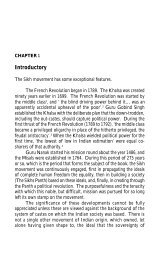Fundamentalism and the Sikh Religious Tradition by T.N. Madan
Fundamentalism and the Sikh Religious Tradition by T.N. Madan
Fundamentalism and the Sikh Religious Tradition by T.N. Madan
You also want an ePaper? Increase the reach of your titles
YUMPU automatically turns print PDFs into web optimized ePapers that Google loves.
upon <strong>the</strong> old boon, when Amar Das departed for <strong>the</strong> heaven. Sri Nanak was recongnised<br />
in Angad, <strong>and</strong> Angad in Amar Das. Amar Das was called Ram Das, only <strong>the</strong> saints knew<br />
it, <strong>and</strong> <strong>the</strong> fools did not. The people considered <strong>the</strong>m separate ones, but <strong>the</strong>re were a few<br />
who recognized <strong>the</strong>m as one <strong>and</strong> <strong>the</strong> same. Those who recongised <strong>the</strong>m as one,<br />
successfully understood <strong>the</strong> spiritual phenomenon. Without this recognition, <strong>the</strong>re could<br />
be no success in underst<strong>and</strong>ing. When Ram Das was merged in <strong>the</strong> Lord, <strong>the</strong> Guruship<br />
was bestowed on Arjun. When he left for <strong>the</strong> abode of <strong>the</strong> Lord, Hargobind was seated on<br />
<strong>the</strong> throne. When Hargobind left for <strong>the</strong> above of <strong>the</strong> Lord, Har Rai was seated in his<br />
place. Har Krishan (<strong>the</strong> next Guru) was his son. After him, Teg Bahadur became <strong>the</strong><br />
Guru.<br />
Let us first see what <strong>the</strong> <strong>Sikh</strong>s felt about <strong>the</strong> unity of <strong>the</strong>ir Gurus. We have stated<br />
that both <strong>the</strong> Guru Granth <strong>and</strong> <strong>the</strong> Gurus have pro- claimed that unity. The <strong>Sikh</strong>s from <strong>the</strong><br />
very start, including Bhai Gurdas, call <strong>the</strong> Guru Sacha Patshah, involving his realm <strong>and</strong><br />
supremacy both in <strong>the</strong> spiritual <strong>and</strong> <strong>the</strong> temporal worlds. For <strong>the</strong> <strong>Sikh</strong>s, for all purposes of<br />
reference <strong>and</strong> authority, <strong>the</strong> Guru was Nanak. Even in <strong>the</strong> times of <strong>the</strong> Tenth Master, it is<br />
recorded that "If a wayfarer arrives at midnight, <strong>and</strong> takes <strong>the</strong> name of Guru Nanak, he is<br />
treated as a friend <strong>and</strong> a bro<strong>the</strong>r, no matter he may be an utter stranger or even a thief or a<br />
robber or an evil-doer." The point of significance is that even in <strong>the</strong> time of <strong>the</strong> Tenth<br />
Master, <strong>the</strong> sole prophet of reference was no one o<strong>the</strong>r than Guru Nanak. Then <strong>the</strong>re is<br />
<strong>the</strong> statement of Bhangoo in reply to <strong>the</strong> question of Captain Murray, as to who gave<br />
legitimacy to <strong>the</strong> political sovereignty of <strong>the</strong> <strong>Sikh</strong>s. He replied that it was given <strong>by</strong> <strong>the</strong><br />
Sacha Patshah himself. When asked who was <strong>the</strong> Sacha Patshah, <strong>the</strong> answer was prompt<br />
that it was Guru Nanak who bestowed empirical sovereignty an <strong>the</strong> <strong>Sikh</strong>s. The point of<br />
importance is <strong>the</strong> unity of <strong>the</strong> whole-life or Miri-Piri system of Guru Nanak, in which <strong>the</strong><br />
empirical component was an essential part of his spiritual system. Fur<strong>the</strong>r, <strong>the</strong>re are <strong>the</strong><br />
seals of B<strong>and</strong>a Bahadur, Jassa Singh Ahluwalia, <strong>and</strong> Ranjit Singh in which Guru Nanak<br />
has been referred to as <strong>the</strong> Master of both <strong>the</strong> worlds, namely, spiritual <strong>and</strong> <strong>the</strong> empirical,<br />
<strong>and</strong> <strong>the</strong> bestower of <strong>the</strong> Sword to <strong>the</strong> <strong>Sikh</strong>s<br />
An allied aspect is <strong>the</strong> impression <strong>the</strong> <strong>Sikh</strong> society gave to its adversaries about<br />
its faith <strong>and</strong> its prophet. Qazi Nur Mohammad who came with Abdali, during his<br />
invasions in <strong>the</strong> eighteenth Century, wrote that <strong>the</strong> <strong>Sikh</strong>s were not Hindus <strong>and</strong> that <strong>the</strong><br />
new religion which was distinct from Hinduism had been created <strong>by</strong> Guru Nanak.<br />
Fur<strong>the</strong>r, <strong>the</strong>re are <strong>the</strong> orders of <strong>the</strong> Moghal Emperor <strong>and</strong> Governors in <strong>the</strong> eighteenth<br />
century, which state that 'Nanak Pathis' should be eliminated <strong>and</strong> that rewards would be<br />
given for <strong>the</strong>ir destruction. This shows that <strong>the</strong>re was only one entity, namely, <strong>the</strong> 'Nanak<br />
Panthis' or <strong>Sikh</strong>s, whom <strong>the</strong> rulers of <strong>the</strong> day considered to be <strong>the</strong> opponents worth<br />
liquidation. Nowhere is <strong>the</strong> order confined only to Amritdharis, Singhs, or Khalsas. In<br />
fact, <strong>the</strong>se terms are not mentioned in related official records. This clearly shows that<br />
making distinction of ideology or faith as between Nanak Panthis, on <strong>the</strong> one h<strong>and</strong>, <strong>and</strong><br />
<strong>Sikh</strong>s, Khalsa, Amritdharis, <strong>and</strong> Singhs, on <strong>the</strong> o<strong>the</strong>r h<strong>and</strong>, is a recent contrivance,<br />
unknown to <strong>the</strong> insiders, outsiders or <strong>the</strong> adversaries of <strong>the</strong> <strong>Sikh</strong>s, before <strong>the</strong> nineteenth<br />
century. The confusion has arisen, becuase in <strong>the</strong> nineteenth century during <strong>the</strong> rule of<br />
Ranjit Singh when <strong>the</strong> <strong>Sikh</strong> star was ascendant, many fair-wea<strong>the</strong>r friends entered <strong>the</strong><br />
<strong>Sikh</strong> fold. At that time becoming a <strong>Sikh</strong> only meant gaining prestige <strong>and</strong> benefits without<br />
any risk of liquidation as in <strong>the</strong> earlier century, <strong>and</strong> it is <strong>the</strong>y who reverted to Hinduism<br />
after <strong>the</strong> annexation of Punjab.
















